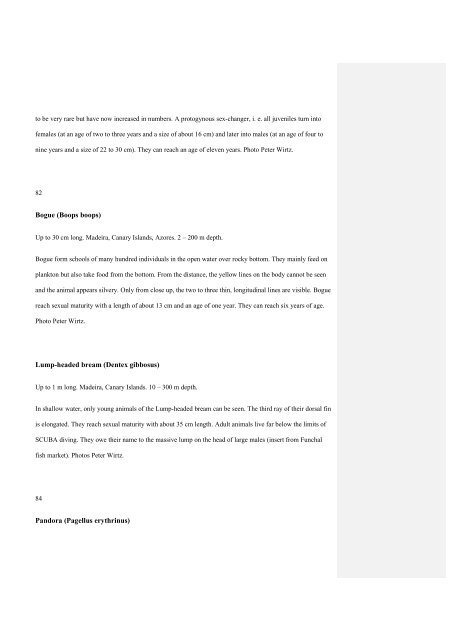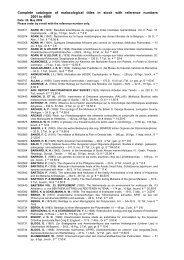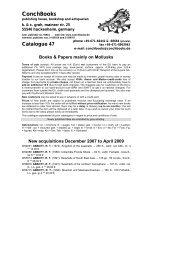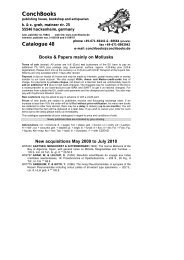Madeira Canary Islands Azores – Fishes Dr. Peter Wirtz
Madeira Canary Islands Azores – Fishes Dr. Peter Wirtz
Madeira Canary Islands Azores – Fishes Dr. Peter Wirtz
You also want an ePaper? Increase the reach of your titles
YUMPU automatically turns print PDFs into web optimized ePapers that Google loves.
to be very rare but have now increased in numbers. A protogynous sex-changer, i. e. all juveniles turn into<br />
females (at an age of two to three years and a size of about 16 cm) and later into males (at an age of four to<br />
nine years and a size of 22 to 30 cm). They can reach an age of eleven years. Photo <strong>Peter</strong> <strong>Wirtz</strong>.<br />
82<br />
Bogue (Boops boops)<br />
Up to 30 cm long. <strong>Madeira</strong>, <strong>Canary</strong> <strong>Islands</strong>, <strong>Azores</strong>. 2 <strong>–</strong> 200 m depth.<br />
Bogue form schools of many hundred individuals in the open water over rocky bottom. They mainly feed on<br />
plankton but also take food from the bottom. From the distance, the yellow lines on the body cannot be seen<br />
and the animal appears silvery. Only from close up, the two to three thin, longitudinal lines are visible. Bogue<br />
reach sexual maturity with a length of about 13 cm and an age of one year. They can reach six years of age.<br />
Photo <strong>Peter</strong> <strong>Wirtz</strong>.<br />
Lump-headed bream (Dentex gibbosus)<br />
Up to 1 m long. <strong>Madeira</strong>, <strong>Canary</strong> <strong>Islands</strong>. 10 <strong>–</strong> 300 m depth.<br />
In shallow water, only young animals of the Lump-headed bream can be seen. The third ray of their dorsal fin<br />
is elongated. They reach sexual maturity with about 35 cm length. Adult animals live far below the limits of<br />
SCUBA diving. They owe their name to the massive lump on the head of large males (insert from Funchal<br />
fish market). Photos <strong>Peter</strong> <strong>Wirtz</strong>.<br />
84<br />
Pandora (Pagellus erythrinus)









